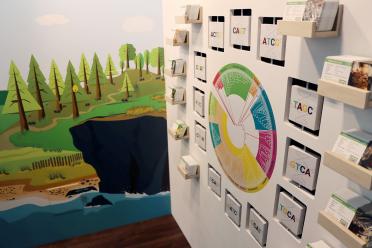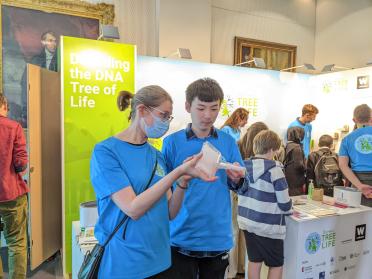Visitors to the festival will discover the Darwin Tree of Life project - a collaboration between ten leading research organisations, funded by Wellcome, combining expertise across biodiversity, genomics, and DNA analysis.
The central goals are to understand how the diversity of life on Earth evolved, explore the biology of organisms and ecosystems, aid conservation efforts, and provide new tools for medicine and biotechnology.
The Darwin Tree of Life project is one of several initiatives across the globe working towards the ultimate goal of sequencing all complex life on Earth, in a venture known as the Earth BioGenome Project.
From 11 - 18 February, scientists working on the ambitious project will be inviting the public to go on an interactive journey with them. You’ll learn about genome sequencing, find out why biodiversity matters, and be invited to try your hand at the fieldwork and DNA analysis involved in this initiative - searching for hidden traces of organisms on the stand and identifying species from their unique genetic code.
The Earlham Institute, based on the Norwich Research Park, is one of the key collaborators, providing crucial expertise in sequencing, data management and storage, and for cataloguing some of the poorest-understood species found on Earth - the microscopic single-celled protists.
Earlham Institute researchers will be on the stand to guide you on your journey and answer any questions, including explaining what protists are, why they’re important, and what makes their genomes so fiendishly difficult to sequence.
Professor Neil Hall, Director of the Earlham Institute, said: “This is an opportunity to find out about one of the biggest sequencing projects in the world and hear from some of the people leading the work. Based around the UK, they’re studying anything from microbes in pond water through to golden eagles.
“Cataloguing genomes is crucial to understanding how sequences of DNA have given rise to the incredible diversity of life on Earth. Ultimately, it’ll transform our understanding of biology and evolution, help us to better protect biodiversity, and potentially generate new and unforeseen benefits for society, such as technology or even medicines.”
The unmissable ‘Decoding the DNA Tree of Life’ stand will be located in The Forum atrium for the entire festival and is free to visit.
Professor Mark Blaxter, Programme Lead for the Tree of Life programme at the Wellcome Sanger Institute, said: “All of us are connected by the common thread of our shared DNA, and DNA connects us to all life.
“The Darwin Tree of Life project aims to decode the DNA of all species in Britain and Ireland, and to use this to trace the connections between species - looking back through evolutionary time at the tree of life, investigating ecological webs in the present day and predicting the future of life on our planet. In the process, we will better understand ourselves.
“We want to connect everybody to the excitement we feel about genomics and the future it promises, exploring where we have come from, how we are inextricably interlinked today, and where we might go in the future. We are looking forward to an open conversation about how genomic knowledge can help us start to tackle some of the biggest problems facing our societies and the natural world today.”
The Darwin Tree of Life project is a collaboration between the Earlham Institute, EMBL-EBI, Marine Biological Association, Natural History Museum, Royal Botanic Garden Edinburgh, Royal Botanic Garden Kew, and the Wellcome Sanger Institute, along with teams at the Universities of Cambridge, Edinburgh and Oxford.
For more information about the event, visit norwichsciencefestival.co.uk.


